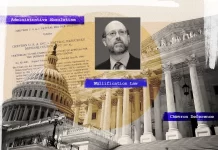The “Wild West” is a place without laws or controls. This definition perfectly describes the federal government’s prosecution in U.S. vs. Trump. The feds are using the resources the nation to target one person, Donald Trump. The law under the Biden administration is whatever prosecutors deem it to be. The prosecutors are the federal government’s gunslingers who settle differences with anyone who does not follow their commands.
Sadly, however, the vagueness of our Constitution allows federal prosecutors the discretion to charge anyone with criminal conduct, even if the charges are false. Rarely are prosecutors held accountable for such misconduct.
While most citizens understand that the federal government can destroy any person it decides to eliminate, there has been little serious constitutional or philosophical thinking on the issue until the indictment of the former president. Now the entire nation sees how the federal government can use prosecutors to destroy Democracy.
In a rare report on prosecutorial discretion, The Anatomy of Discretion: An Analysis of Prosecutorial Decision Making – Technical Report, the authors write, “Prosecuting attorneys enjoy broader discretion in making decisions that influence a criminal case than any other actors in the American justice system. That they do so with little or no public scrutiny suggests questions about justice and fairness.” Former Supreme Court Justice Robert H. Jackson publicly addressed this lack of accountability. He stated, “The prosecutor has more control over life, liberty, and reputation than any other person in America.”
Possessing such unsupervised power can lead to selective prosecution, which is pursued to advance bias, personal beliefs, or the political conquest in the case of Trump.
The only real check on prosecutorial misconduct is the federal judge. Unfortunately, no matter how competent the judge, the prosecutors can easily deceive the court with little to no consequence. The government intentionally misled the FISA court and the prosecution of several Trump supporters on national security matters. While the government’s criminal misconduct was laid out in the Durham Report, it was ignored by President Biden and the entire judicial system.
The court’s reluctance to hold the Justice Department accountable for misconduct is allowing Democrats to fiercely attack the trial Judge Aileen Cannon, the presiding trail judge in U.S. vs. Trump. She was selected by a random draw, which is common in federal court.
The Democrat’s concern is merely that President Trump appointed her. Immediately, “a chorus of [Democrat] legal experts” demanded she recuses herself from the case. Democrat Senator Whitehouse called the judge a “Trump advocate in a robe.” Moreover, a chorus of Democrat “scholars” are telling the American public a “not guilty” verdict will be a political decision, notwithstanding that the entire indictment is political vendetta.
Judge Cannon is now the only person in the world who can force prosecutors to act honestly and ethically. As a Trump appointee, it is likely the Democrats will destroy her life.
The Special Counsel [Jack Smith] in the Trump indictment case is an excellent example of abusing prosecutorial discretion to secure convictions. In his quest to destroy the brilliant career of former Virginia Republican Governor Robert McDonnell, Smith indicted the Governor and his wife by using extremely questionable and expansive legal theories concerning public corruption. In a rare unanimous decision, the Supreme Court of the U.S. vacated Governor McDonnell’s conviction. The court characterized Smith’s prosecution as a “boundless interpretation of the federal bribery statute.”
Similar “boundless interpretations” are present in the Trump indictment. Specifically, in the discovery aspect of the case, D.C. district judge Beryl Howell, an Obama appointee, allowed the prosecutor to breach Trump’s attorney-client privilege and dispose of Trump’s attorney. It has been the right of a client to assert the attorney-client privilege since the 16th century. It grants a client the right to refuse to disclose and prevent his attorney from disclosing confidential communications between the client and his attorney. While Judge Howell allowed Smith to obtain evidence in discovery from Trump’s lawyers, that ruling will be reviewed by Judge Cannon before the evidence can be used at trial.
Trump’s new legal team will likely move to preclude at trial the use of any evidence obtained from Trump’s prior attorney, which is the foundation of Smith’s case. If Judge Cannon excludes the attorney’s testimony as privileged, the prosecutor has a much weaker to non-existent lawsuit against Trump. Again, Smith can only win by using “boundless interpretations” of the law.
Compounding the boundless interpretations of the law, the prosecutor is making an ex post facto (retroactive) change in the policy of the Department of Justice. The Department of Justice ended the Hillary Clinton investigation involving the destruction of documents by concluding her actions were not intentional. Clinton used bleach bit to purge all computer files and a hammer to destroy her cell phones. While the FBI concluded Clinton was extremely careless in handling very sensitive, highly classified information, it concluded that under existing policy, there was no clear evidence of intent to violate the law. Then FBI director Comey, based on past similar situations, pronounced the standard for prosecuting presidential candidates as requiring clear, intentional, and willful mishandling of classified information in a way that indicated disloyalty to the U.S.
While the Constitution prohibits Congress from passing retroactive laws, the Supreme Court has applied that prohibition to federal agencies, like the Department of Justice, that have been granted legislative power to make law through notice and comment rulemaking. As a result, an agency must go through a public rulemaking process before changing its policy.
Under such reasoning, the legal standard set by FBI Director Comey in the Hillary Clinton investigation is the standard that must be applied to Trump. If Clinton’s use of bleach bit to destroy all information and a hammer to destroy cell phones is considered non-intentional conduct, Trump’s mere possession of files cannot be criminal under the Comey rule since the files still exist. If the Department of Justice wants to change existing law or policy, it must follow a rulemaking procedure.
Government cannot retroactively change the legal standards that determine criminal conduct. Justice Cardozo summed up the problem of retroactively changing policy without going through the proper procedures when he stated:
‘Law as a guide to conduct is reduced to mere futility if it is unknown and unknowable.”
The federal government’s actions are reprehensible, unconstitutional, and destructive to the Republic. The mistrust of the federal government is almost universal. Rasmussen found that 37% of all U.S. voters “fear the federal government.” More than half of voters (54%) believe the federal government threatens individual liberty, and only 22% view it as a protector of freedom. A Chapman University study of “Fear” found the number one fear among Americans is corrupt government officials. Seventy-nine percent were very fearful or fearful of a corrupt government. Pew found only 20% of Americans trust the government.
Every action by the federal government that gives the appearance of abusive power destroys Americans’ faith in their government. Why would a federal government regularly act in a manner that weakens the bonds of union? Is the real intent of the federal government to destroy the United States? The American people are answering the question with a “yes.”







![It’s amazing . . . just how filthy this case [against TRUMP] is!](https://www.thethinkingconservative.com/wp-content/uploads/2024/04/maxresdefault-256-218x150.jpg)





































